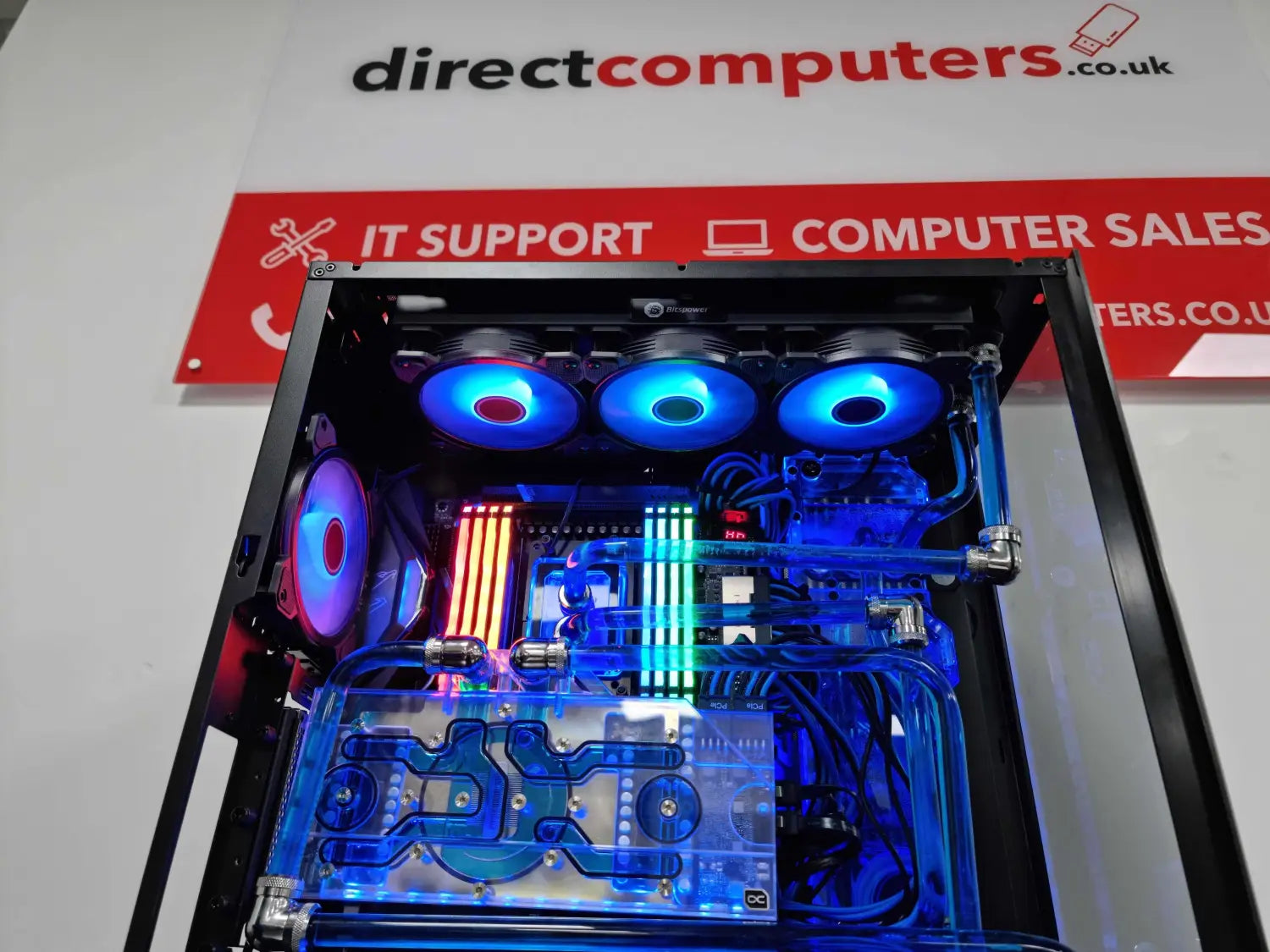We know what you’re thinking: water, electronics. Don’t mix them. Just don’t.
Don’t we?
More and more, custom water cooling in PCs is becoming more popular than ever. Not only is it the best type of cooling out there for the overclockers among us, but they look cool as hell! We’ve built quite a few now, and we’re always so impressed with not just looks, but its function too. They involve replacing the stock air cooling system with a custom-built water cooling system that uses water to dissipate heat away from the CPU and other components.

One of our custom water loop builds.
Interested? It’s certainly not the cheapest option, but it’s the best prevention against overheating, so we recommend these for the most hardcore of you out there. People who are going to ask a lot from their PC and put it under a large amount of stress. Generally, fan cooling will be a lot louder because…well, they’re fans, and fans make noise! Water cooling is more often than not a heck of a lot quieter, but it’s worth doing some research into it if this is the route you want to go down.
When building a custom water loop, it is important to choose high-quality components that are compatible with one another. This includes the water block (which attaches to the CPU), the pump, the radiator, the tubing, and the fittings. So let’s go through these one at a time and what they do.
The Water Block
One of the key components of a custom water loop is the water block. It is the part that comes in direct contact with the CPU and is responsible for removing heat from it. There are several different types of water blocks available, including those that are designed specifically for CPUs, GPUs, and even memory. When selecting a water block, it is important to ensure that it is compatible with the CPU or other component that it will be used with.
The Pump
The pump is another important component of a custom water loop. It is responsible for moving water through the loop, and therefore must be powerful enough to circulate water effectively. A good rule of thumb is to choose a pump that has a flow rate of at least 400 L/hr.
The Radiator
The radiator is responsible for dissipating heat away from the water, and therefore must be large enough to handle the amount of heat that the CPU and other components will generate. A good rule of thumb is to choose a radiator that has at least twice the surface area of the water block.
The Tubing and Fittings
The tubing and fittings are also important components of a custom water loop. The tubing is responsible for transporting water from the pump to the radiator and back again, and therefore must be flexible and durable enough to withstand the pressure and temperature of the water. Fittings are used to connect the tubing to the water block, pump, and radiator, and must be the correct size and type to ensure a secure and leak-free connection.
Maintenance
Custom water loops definitely look cool, but it’s imperative to remember if you want a custom water loop for your next build that you need to know how to maintain it properly too. Water loops are designed to be water tight, but everything is subject to wear and tear given enough time. Therefore, it’s important to regularly check for leaks and being confident enough to tighten any loose fittings that might occur over time. Maintenance also includes keeping the water clean and free of debris by using a high-quality water filter or adding a biocide to the water, which will prevent germ accumulation and algae growth in cooling system pipes and on surfaces, thereby ensuring stable heat transfer within the cooling system. It is also important to periodically drain and refill the loop to remove any build-up of mineral deposits or other contaminants. When refilling the loop, it is important to use high-quality, distilled water to ensure that the water is free of impurities, and adding biocide can help as described above.
Another important aspect of maintaining a custom water loop is to keep a regular eye on the temperature of the water. A temperature that is too high can indicate a problem with the water block, pump, or radiator, and may require that these components be cleaned or replaced.
Finally, it is important to periodically check the tightness of all the fittings and connections. Over time, fittings can become loose due to the expansion and contraction of the tubing caused by changes in temperature. This can lead to leaks, so it is important to keep them tight.

Custom water loops are endlessly customisable too!
So, have you been convinced or scared off? I personally love the look of custom water cooling PCs, and they can be lifesavers for people who want to send their PCs to their absolute limits without it sounding like a jet engine at the same time. We highly suggest asking us for some advice if you’re interested in going down the custom water loop road as we’re always ready to chat, not to mention, we’ve got a fair bit of experience under our belt of building these kinds of builds now, so you can be assured you’re in safe hands if you want to order a custom water loop PC.







